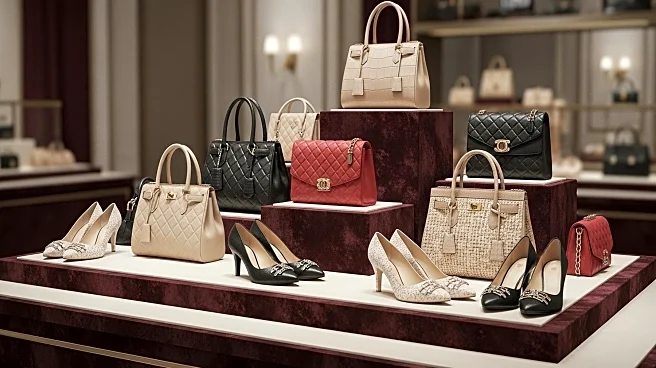What is the story about?
What's Happening?
Luxury brands are increasingly focusing on the resale market to maintain their brand image and protect their identity-driven value. New research highlights the psychological impact of purchasing secondhand luxury items from official versus unofficial retailers. When consumers buy from official retailers, they engage in high-level construal thinking, focusing on abstract aspects like identity and status. Conversely, purchases from unofficial outlets lead to low-level construal thinking, emphasizing concrete details such as price and condition. This shift in consumer mindset can significantly affect brand perception, with official settings enhancing brand image and unofficial settings diminishing it. Brands like Rolex and Selfridges are taking proactive steps by launching official pre-owned programs and investing in curated resale platforms to safeguard their brand's abstract associations.
Why It's Important?
The resale market for luxury goods is expanding rapidly, growing at over 14% annually. This growth is driven by new generations of consumers who prioritize access and sustainability. For luxury brands, the resale environment is a strategic touchpoint that can either protect or erode brand equity. By controlling the resale context, brands can maintain their identity-driven value and prevent reputational damage. The shift towards official resale programs is not just a tactical move but a psychological safeguard to preserve the abstract associations that make luxury brands valuable. Ignoring this market could lead to unofficial retailers dominating, which risks reducing a brand to mere product specifications and price points.
What's Next?
Luxury brands are likely to continue expanding their official resale programs and partnerships with credible platforms. This strategic approach will help them co-opt parts of the resale ecosystem, integrate certification services, and offer trade-in programs. By doing so, brands can insert cues that elevate consumer construal levels, reinforcing the identity-driven value of their products. Consumers, on the other hand, can benefit from understanding how context shapes perception, allowing them to make more meaningful secondhand purchases. The future of luxury resale will likely see brands strengthening their sustainability credentials and deepening ties with consumers through identity-driven strategies.
Beyond the Headlines
The psychological dynamics of resale highlight the importance of context in consumer perception. For luxury brands, the store environment matters as much as the product itself. By designing resale environments strategically, brands can expand their customer base and enhance their brand equity. This approach not only protects the brand's reputation but also aligns with the growing consumer demand for sustainable and accessible luxury options. The shift towards strategic resale programs reflects a broader trend in the luxury industry, where meaning and identity are increasingly prioritized over mere product attributes.















